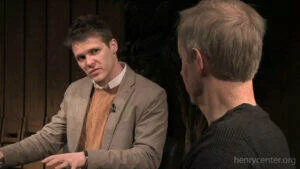I’ve noted that despite an almost universal conviction that witches exist and are able to do terrible things, there are significant numbers of believers who are not personally afraid of witchcraft. This is what I’ve been writing on thus far and what my research conducted among evangelical mission church leaders in northeastern Congo (DRC) has found.
These followers of Christ manage to navigate life without giving in to the pressures of family members or friends who want them to consult a shaman or Christian prophet in order to identify the alleged witch behind their life’s troubles. In my posts, I’ve suggested that we think in terms of three areas of actual pastoral practice that help these Christians live without fear and without joining in the pursuit and persecution of suspected witches.
The first type of pastoral intervention I’ve discussed consists of teaching regarding certain theological principles like faith in the sovereignty of God and in the victory of Christ over all the powers. The second area of pastoral practice has to do with ways in which pastors challenge the epistemology of witchcraft discourses.
Practical Holistic Pastoral Action
Here, I want to look at a third dimension of pastoral practice, consisting of practical holistic action taken with regard to rumors of witchcraft, including service rendered to those caught up in the webs of fear, suspicion, and accusation associated with belief in witches. How do these leaders respond in terms of practical action when situations arise that involve rumors, suspicions, fears, and/or accusations of witchcraft?
Questioning Exorcism
Perhaps the most popular approach for dealing with witches, promoted aggressively by the independent “revival” churches but also increasingly adopted by at least some leaders in the more conservative mission churches, consists of various methods of exorcism aimed at the demons of witchcraft that are believed to empower witches.
Church leaders whom I have interviewed, however, often expressed some real reticence about the efficacy or wisdom of this kind of approach, at least as a general first line of response. These church leaders don’t necessarily rule out exorcism in some cases, but tend to argue that there may be more important tools in the toolbox. Several of them told stories of sharing the gospel with someone who had confessed to being a witch, and of calling them to turn from their sin and believe in the Lord Jesus rather than attempting an exorcism. One of the men I interviewed suggested that the loud attempts at exorcism as practiced in the “revival” churches, often involving prolonged shouting matches, might be evidence of a kind of insecurity rather than of any genuine and profound confidence in Christ’s power.
Considering Alternative Causes
The church leaders I interviewed also highlighted the need to be aware of various social, economic, and psychological factors that might lead to false suspicions of witchcraft or provoke wrong accusations. One interviewee told the story of a young man who had physically assaulted his uncle’s wife because a diviner had informed him that this woman was responsible for the failure of his business. The young man’s church rightly placed him under discipline. But his pastor (the interviewee) also took the time to visit him and ask him how he ran his business. It became clear that the young man didn’t know anything about financial management, so the pastor taught him some basic accounting principles. It was not long before the young man had bought a bicycle, a piece of land and had built himself a small house.For a slightly fuller account, see “Pastoral Intervention Related to Witchcraft.” It thus became obvious that his problem had been one of poor business practices and mismanagement of resources rather than witchcraft!
Another interviewee said that pastors and Bible School students should be taught some basic principles of psychology regarding different personality types, along with something about the effects of dementia in old age. He believed it was important for pastors to know these things because sometimes an irascible temperament or a case of dementia might lead to the kind of conflict with others that could eventually result in false accusations of witchcraft.
Caring for the Accused
In addition, several of the men I interviewed argued that pastors and other believers should not abandon those who are the objects of accusation or rumor and gossip, but should continue to show them the love of Christ in practical ways. I heard one pastor, in a series of sermons about witchcraft, encourage his congregation to welcome repentant witches, and to do what they could to ensure their well-being in material as well as spiritual terms. One interviewee went so far as to indicate his willingness to welcome an accused witch into his house as a long-term guest if that individual were to be driven out by other family members. He saw this as both a concrete act of compassion and a testimony to others that Christians have nothing to fear from alleged witches. In his words,
If a suspected witch were to be willing to accept the offer, if for example it is a single person and [he/she] would be willing to come and stay with me, I would take that person, as pastor of the church, into my home. And people would see: “Nothing is happening!” And on their own, people might perhaps begin to admit, “No, that person hasn’t [bewitched anyone].”
It is significant that this particular pastor was also convinced that a witch had killed one of his own children. He nevertheless, despite his conviction that witches do sometimes cause very real suffering, and despite his own personal loss understood in these terms, declared his willingness to offer sanctuary to accused witches.
Another pastor told me the story of a couple in his church who had a child whom they were convinced was a witch. As in many such cases, the child in question had been born to the wife in a previous relationship, and thus her current husband was the child’s step-father. During a period of severe difficulty in their lives, a self-proclaimed “prophet” told them that this particular child was the witch responsible for their problems. He also indicated that the patches of scabies on the child’s head were entry points for demons of witchcraft.
Fortunately, before driving the child out of the house, they came to the pastor, and he and his wife agreed to take the child into their home. They treated his scabies, and generally cared for him along with their own children. The scabies disappeared, and they never saw any evidence of the child’s alleged powers as a witch. Eventually they were able to locate the child’s father, who then took the child to live with him, as is the general pattern in Congolese society in cases of divorce or separation.
In yet another example, one interviewee argued that church leaders ought to be willing to risk their own reputation or even their lives in order to prevent violence against accused witches. He made the point that unfortunately this does not always happen, but insisted that this would be right and proper pastoral practice.For another example of the kind of pastoral intervention I am talking about, see Steve Rasmussen’s “Your Pastor Is Killing You.”
Conclusion
The three fronts on which some pastors are already making a difference in the lives of their parishioners, then, are:
- teaching good theology,
- questioning epistemological foundations, and
- taking concrete actions that engage with accusers and accused in holistic terms rather than in the narrower terms of “spiritual warfare” as popularly conceived.
My intent here is not at all to declare “Mission Accomplished,” or to suggest that there is not still a great deal to be done. As others in this forum have suggested, for the great majority of believers the fear of witches continues to be a nagging and sometimes overwhelming life-issue—an issue, moreover, that can bear extremely bitter fruit.
Nevertheless, as I’ve interviewed pastors who face these issues, my sense is that God has given them some very real wisdom and a genuine faith that enables them to make a real difference in the lives of believers in the churches they lead. This is what we need to encourage as much as possible. What I think could be helpful, then, would be to find ways of developing ideas like these in systematic fashion in the form of teaching materials that could be used for leadership training more broadly.








Comments
Be the first one to make a comment!